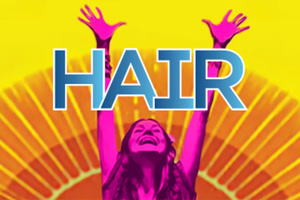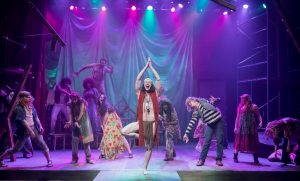WHEN LOVE SEEMED ALL
A half century can wreak a ton of change, especially when it takes us from 1967’s Summer of Love to 2017’s Winter of Trump. It’s impossible to imagine two more different destinies for the same nation’”antiwar protests mellowed by free love and diverse drugs versus hardline xenophobia, race hate and jingoism marinating in ignorance and fed by paranoia.
Of course, America is too vastly complex to be summed up by either excess. But it’s both a reproach to the present and a promissory note for the future to re-view Hair, “The American Tribal Love-Rock Musical.” For better and worse, it’s back with all its calculated innocence and frenetic free expression intact and not embalmed.
Now grooving at the Mercury Theatre, Brenda Didier’s revival reinvents the magic over two generations later: In effect, the actuarial grandchildren of the show’s first coming invoke its indomitable spirit in this latest reprise. Created 50 years ago by James Rado and Gerome Ragni, with music by Galt MacDermot, Hair was, as the title implies, a celebration of youth and vitality. It’s comprised of neo-vaudevillian, in-your-face, sweetly warbled “songs as stunts” whose names’”“Hashish,” “Sodomy,” “Colored Spade,” “I Got Love”’”are unashamed, message-mongering manifestos.
Embodying the “Age of Aquarius” are a ragtag assemblage of happily homeless hippies hanging out in Central Park and Greenwich Village. A vanguard of social dropouts (“Ain’t Got No“) for whom love is no abstraction and peace a palpable purpose, this happy horde oppose war in general and the Vietnam “conflict” in particular (although 55,000 young Americans died just as if it was a war), dodging induction or burning their draft cards.
Led by their charismatic but flawed shepherd Berger (Matthew Keffer), the self-sustaining colony indulge in Hare Krishna-fueled “happenings” where getting high and being alive amount to religious ritual. They mock American history as institutional oppression (“Abie Baby”). They prefer to cling to a credo of living off the land (“Good Morning Starshine”), literally letting down their hair (“I Believe in Love”), and going with the flow (“Walking in Space”). Well before global warming and climate change, their cosmic consciousness and earth worship entail an embryonic environmentalism (“Air”).
Suggesting the makeshift spontaneity of their surroundings, Jeffrey D. Kmiec’s set employs ladders and scaffolding, cascading banners of earth-toned fabrics, and the “found” detritus of an improvised playground. Here the “tribe” celebrate a non-violent rebellion. It’s not all blissed-out be-ins. Berger, who identifies with Lucifer as a “fallen angel,” too often acts the part: His proto-feminist girlfriend Sheila (Michelle Lauto) learns from her abusive mate that it’s “Easy To Be Hard.” An androgynous tourist’”named after sociologist Margaret Mead (Craig Underwood)’”projects her own identity crisis onto these gender-breaking transients. Too unsure of his sexuality to come out, Woof (Aaron M. Davidson) sublimates his homosexuality in a fetish for Mick Jagger. Then there’s simple Crissy (Leryn Turlington), content to luxuriate in the mere memory of a boy who got away (“Frank Mills”).
But the chief crisis involves an act of human sacrifice. A free spirit who imagines himself a foreigner (“Manchester, England”) in his own land, Claude Bukowski (Liam Quealy) has received his draft notice (“Three-Five-Zero-Zero”), to the dismay of his pregnant girlfriend Jeanie (Lucie Godinez). Wondering “Where Do I Go” (the famous first act finale with its stylized nudity), Claude faces a wrenching separation from his cohorts that makes the concluding anthem “Let the Sun Shine In” seem as fragile as it is hopeful.
If only everything old were new again. 2017’s cultural context makes Hair something between archetype and artifact, under glass like the discarded headbands of bald-headed baby boomers. Inevitably it resonates more with “what might have been” than with “telling it like it is.” The ironic Shakespearean tribute “What a piece of work is a man!” founders on Hamlet’s pessimism and despair.
The real revolution behind Hair was producer Michael Butler opening up Broadway to flower children and long-haired dreamers. But today, again echoing the Bard, the less-touted final number makes its valedictory, “Eyes Look Your Last.” Still, there’s no discounting the precise passions unleashed on the Mercury stage two wars later. For two and a half hours we can pretend that maybe the last 50 years were just a “bad trip.”
photos by Brett A. Beiner
Hair: The American Tribal Love-Rock Musical
Mercury Theater Chicago, 3745 North Southport Avenue
Wed-Sat at 8; Sat and Sun at 3
ends on September 17, 2017 EXTENDED to September 14, 2017
for tickets, call 773.325.1700 or visit Mercury Theater
for more theater info, visit Theatre in Chicago







